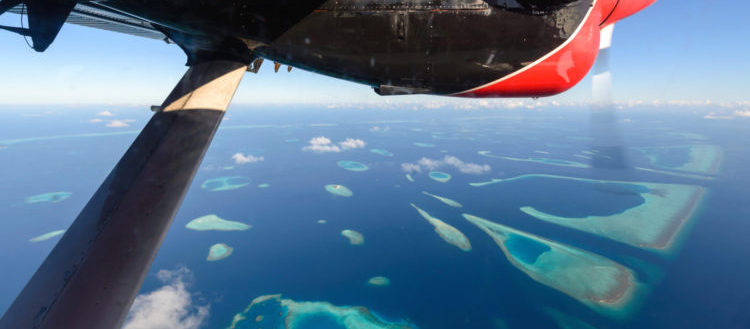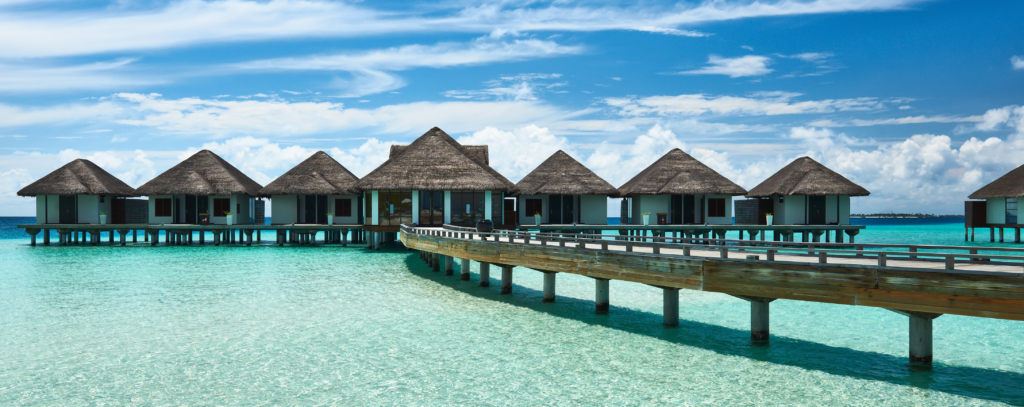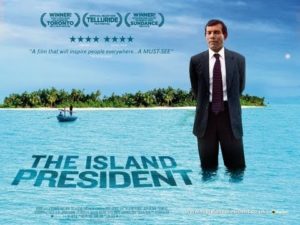
Paradise?
How many countries have a President that has been tortured by its own government?
One country that has: the Maldives.
If you asked most points and miles enthusiasts for a shortlist of exotic destinations that they would like to redeem points for, most would have the Maldives on that list. I must admit, it’s on my list too. For most people that are lucky enough to travel there, the Maldives is often described as heaven on Earth, and a quick Google image search will show why; it’s an absolutely serene landscape consisting of over 1,000 coral islands, white sand beaches, clear waters, amazing reefs, and exotic overwater bungalows and huts. To put it simply, when the terms vacation and paradise are lumped together, the Maldives must also be included in the same sentence.

Maldives (officially the Republic of Maldives) is island nation located southwest of India in the in the Indian Ocean–Arabian Sea. The country is composed of of 1,192 coral islands and spread over roughly 35,000 square miles, making this one of the world’s most unique and dispersed countries. It has a population of about 394,000 people (Male it’s capital is around 63,000 concentrated on a small island), it’s own language (Maldivian), Islam as the major religion, and is the lowest country in the world. The entire country averages only 1.5 metres (4 ft 11 in) above sea level and significant concern has arisen for the future of the country because of rising sea levels.
For many the Maldives is the ultimate travel escape. However, what most people don’t realize is that the country also has a dark side. In the same light that it is thought of as heaven on Earth, the Maldives has also been (and continues to be) hell on Earth for some of its citizens.
If you like watching movies, you may have seen the film “The Island President”, a film that tries to highlight the effect of global warming on the Maldives and other countries like it.

The Island President, 2012
The star of the film, President Mohamed Nasheed, gained near celebrity status after the film and had countless write-ups in major publications as well as being featured on shows like The Late Show with David Letterman, CNN, BBC, PBS, Al-Jezeera, and other major media outlets around the world. During much of his time in the spotlight, he has been a an environmental activist for his country, trying to create a consensus with the rest of the world to slow the growth of of carbon emissions which he believes is causing rising sea levels to endanger his country. But there is much more to his story and to that and of the Maldives.
For decades the Maldives was ruled by a dictator, Maumoon Abdul Gayoom. Gayoom’s autocratic rule used terror tactics against dissidents, arbitrary arrests, detention without trial, torture, forced confessions, politically motivated killings, and severe restrictions on freedom of the press.
Before becoming president, Mohamed Nasheed was sent to prison in 1990 after writing an article in the political magazine Sangu that alleged that the government had rigged the 1989 general election. All told, Nasheed has been arrested more than twenty times and claims to have been tortured while in prison too. While he was in prison, he also missed the births of both of his daughters.
A few years after being released from prison, Mohamed Nasheed was elected to Parliament in 1999 and became president of the Maldives in 2008 and served until 2012. After four years in office, Nasheed resigned as President in 2012, citing a coup d’état which forced him – at gun point – to transfer power and step down. After stepping down, Nasheed was arrested again in February 2015. The day after that arrest, thousands of citizens protested in the streets of the capital.
Recent Events
But President Nasheed’s struggle along with other current issues illustrate a path that the Maldives is on. In February 2013, a fifteen-year-old girl was sentenced to 100 lashes and house arrest for 8 months for engaging in premarital sex. To add to this, charges were brought against her in 2012 after police investigated accusations that her stepfather had raped her and killed their baby. He has not faced trial. Prosecutors stated her conviction did not relate to the rape case; she was sentenced for fornication, which they claimed was a different matter. Homosexuality and nudism are also illegal in the country.
In April 2014 the government of the Maldives ended a 60-year moratorium on executions. In the Maldives, people are now criminally responsible for their acts starting at the age of ten. In some cases like theft, fornication, consumption of alcohol and apostasy, the age limit falls to seven. However, in the case of murder the sentence cannot be carried until the culprit reaches the age of 18. This essentially means that children have to remain incarcerated on death row until the age of 18.
Most people with knowledge of the Maldives know that Islam is the official religion of the Maldives. What they may not know or forget to mention is that open practice of any other religion is forbidden and liable to prosecution. It’s even illegal to have any “representations” of other religious “idols” in the country. If a person packed a bible and cross into luggage and had it inspected in the airport, it makes a person wonder what kind of reaction that would get?
While the judges in the country are independent, and subject only to the Constitution and the law. When deciding matters on which the Constitution or the law is silent, judges must consider Islamic Shari’ah.
The Constitution of the Maldives states that:
– the republic is based on the principles of Islam.
– law includes the norms and provisions of Sharia.
– a non-Muslim may not become a citizen
– no law contrary to any principle of Islam can be applied
– citizens are free to participate in or carry out any activity that is not expressly prohibited by sharia or or by the law.
The Maldives Constitution can be read in English here.
Conclusion
There are still many people who haven’t heard of the Maldives, but the more that a person gets into the points hobby, the greater the likelihood that they will come to know it. But many people familiar with the country, and those travelers who have visited it before, probably know little about its history and current situation. Most travelers there fly into the capital, hop on a small prop plane with a possible boat transport to their island oasis, complete with overwater bungalows, crystal blue water and first class service and complete tranquility. The residences for most guests are far away from where the citizens of the country live, nearly every travel article and points feature that I’ve come across offer no insight into the plight of the people living in the Maldives, or the current situation there.
Maldives is obviously a beautiful place and one that I would love to visit, but its recent history and slow slide towards an authoritative regime are factors that may ultimately take it off my top destinations list. For now though, I’m keeping it on my list of top exotic destinations – hopefully it will remain there.
How to get there:
It’s a jaunt to get to the Maldives from just about everywhere, there’s just about any route involves some work. Once you land at the Malé International Airport, a journey that usually lasts between 20 minutes to an hour will be needed to reach the closer resorts, while a sea plane is used for more remote resorts. The sea plane rides themselves are often a really cool experience and a highlight for many of the vacation. Sea plane transportation comes at an extra cost and must be arranged in advance, usually running about US$400 round trip per person. Some paid flight deals pop up from time to time for the Maldives, but in general this is an exotic, expensive location. With that said, I would highly recommend using award miles and points as much as you can to make your trip more affordable.
There are many flights into Malé International Airport from all over and are mostly long-haul flights in wide-body planes, so even those in economy class will have a good-sized seat with decent legroom. In general if I were leaving to visit the Maldives next week, I would look at flights to India, then board a flight from India to the Maldives. There are no direct flights from the US to Male, but there are many travel options for those seeking to visit. It just depends on what miles that you may have and what your budget is for the trip. Some airline options for getting to the Maldives include:
Using United miles:
EVA Air and Singapore Airlines
Turkish Airlines
Austrian Airlines
Using American Airlines AAdvantage miles:
Quatar Airlines
Cathay Pacific
Using Delta Skymiles:
China Southern
Aeroflot
Korean Air
Other Possibilities:
Cathay Pacific (using AMEX Rewards, BA Avios, Alaska Airlines)
Singapore Airlines
Korean Air (Chase Ultimate Rewards)
Eitad Airlines
Korean Air using Chase Ultimate Rewards points
Cathay Pacific using British Airways miles
Hainan Airlines using Air Berlin miles
